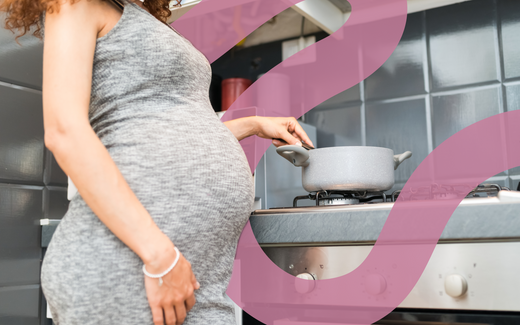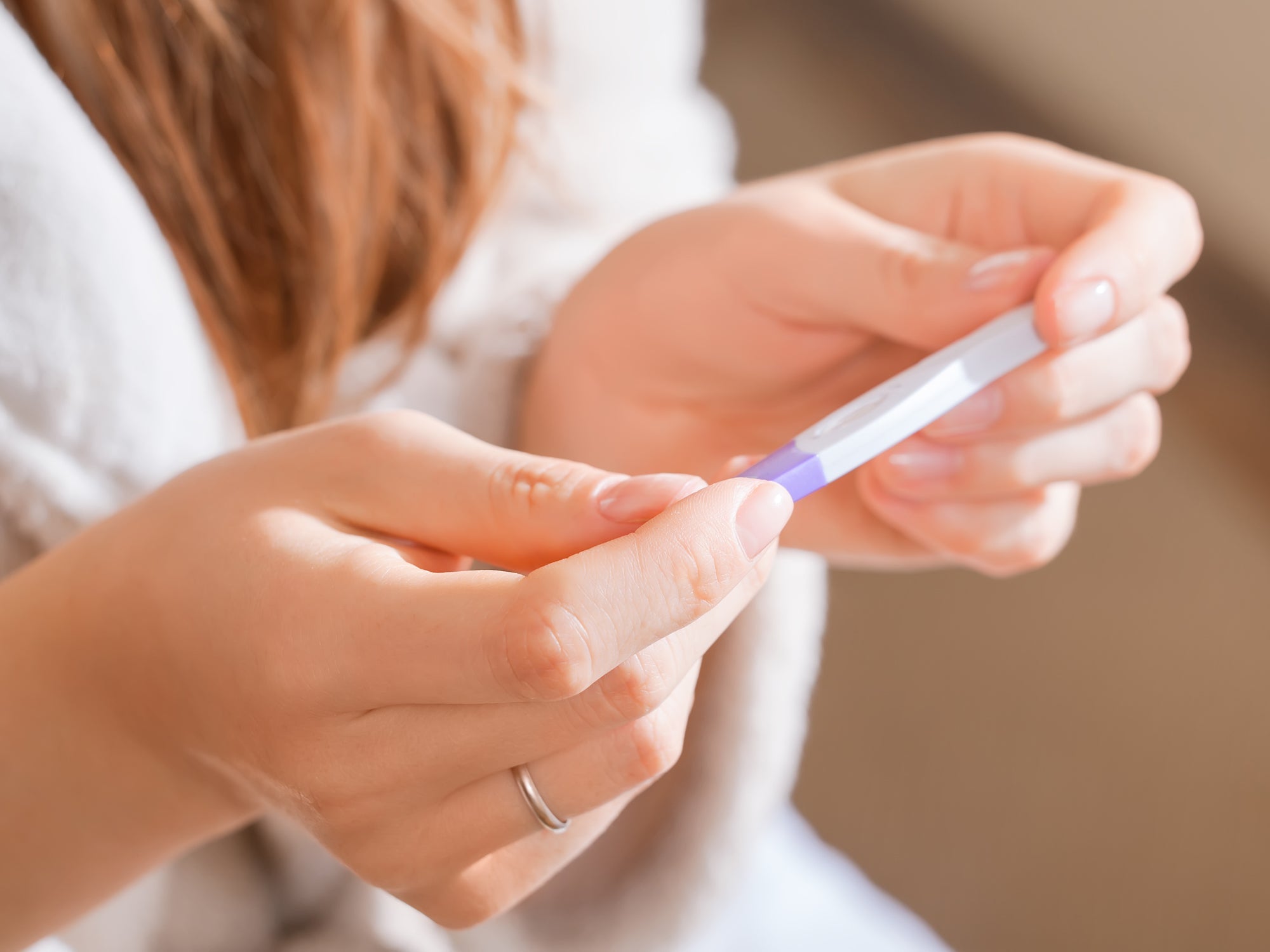Find out what our CEO Erika Tyburski, who’s battled anemia during pregnancy, has to say for expectant mothers.
Up to 1-in-4 women experience some form of anemia during pregnancy, according to the American Pregnancy Association. This can not only affect your health, but your child’s as well.
And even if your iron levels are typically within a normal range, pregnancy can increase your anemia risk. That’s why it’s important to make sure you’re getting enough iron in your diet, and to track your hemoglobin levels as often as possible.
In this piece, we’ll discuss everything you have to know about anemia during pregnancy from why expectant mothers are more likely to develop it, how it can affect your child, and what you can do to treat and prevent it.
Plus, we’ll give you some tips from Sanguina CEO Erika Tyburski, who’s struggled with anemia her whole life and, as of this writing, is pregnant with her second child. She’ll let us know how she’s treated her anemia during pregnancy, and what she wants other pregnant mothers to know.
Why Are Pregnant Mothers at Higher Risk for Anemia?
Anemia is a condition in which there aren’t enough healthy red blood cells to carry oxygen throughout your body. It’s primarily caused when our body’s lack enough iron, which is necessary to create a protein called hemoglobin that helps oxygen bind to our red blood cells (think of hemoglobin as a booster seat, and the cells as a car).
Iron is also necessary to make new red blood cells. In other words, low iron levels equal low red blood cell counts.
During pregnancy, a woman’s body is producing much more blood to support the growth of the child (in addition to carrying oxygen to the mother’s body), and so your body needs much more iron to help provide that increased demand.
Without enough iron, you could develop iron-deficiency anemia. But that’s not the only type of anemia you can have during pregnancy, and other types include folate-deficiency anemia and Vitamin B12-deficiency anemia. Folate and Vitamin B12 are nutrients that are also needed for red blood cell production.
Symptoms of Anemia During Pregnancy

If you have one or more of the following symptoms, you may have anemia during pregnancy.
- Fatigue
- Weakness
- Pale or yellow skin
- Frequent headaches
- Chest pains
- Rapid or irregular heartbeat
- Lightheadedness
If you suspect you may have anemia, contact your doctor or obstetrician immediately to schedule a blood test and get your hemoglobin levels checked.
How Can Anemia Affect My Child During Pregnancy?
If left untreated, anemia can lead to:
- Premature birth
- Low birth weight
- A baby diagnosed with anemia
- A baby born with developmental disorders
- Birth defects
It should be noted that only severe or untreated anemia will have major impacts on your child’s health, which is why it’s important to make sure you’re getting your iron and hemoglobin levels tested frequently.
How Can Anemia Affect Me During Pregnancy?
Again, mild anemia during pregnancy may not cause major health impacts on a mother’s health. But women with severe or untreated anemia may experience:
- Postpartum depression
- Trouble concentrating
- Fatigue
- Vertigo
Who’s At Risk of Anemia During Pregnancy?
Every pregnant women is at a mild risk of anemia during pregnancy, but the following women may be at an even greater risk:
- Those who experience frequent morning sickness
- Women who have two pregnancies close together
- Pregnant teenagers
- Women pregnant with more than one child
- Women who had anemia before pregnancy
- Women who eat a plant-based diet
How Can I Treat Anemia During Pregnancy?
The best way to treat anemia during pregnancy is to prevent it, and that involves getting enough iron in your diet to support you and your child. And fair warning, you’re going to need a lot of iron.
The Mayo Clinic suggests pregnant women get 27 mg of iron per day, whereas non-pregnant women only need 18 mg per day. That number is going to be different for some women depending on their diet, body weight, and more.
Foods to Eat to Prevent Anemia During Pregnancy
Here are some iron-rich foods you can eat to prevent anemia during pregnancy:
- Dark chocolate
- Spinach
- Green leafy vegetables
- Whole grains
- Iron-fortified breakfast cereals
- Legumes
- Red meat
- Lentils
- Tofu
- Turkey
- Chickpeas
- Potatoes
- Mushrooms
Vitamin C, and Pregnant Plant-Based Eaters

Vitamin C is an important nutrient for our overall health, but if you’re a plant-based eater who’s pregnant it’s especially vital to prevent anemia during pregnancy.
There are two types of iron: heme and non-heme iron. Heme iron is found in plant-based products, like meat and dairy, and is easily absorbed by the body.
Non-heme iron, which is found in plant-based foods, can still be used to support healthy red blood cell production but the body can’t use it quite as easily as heme iron. Vitamin C acts as a key that opens the door to the body’s nutrient absorption system, allowing non-heme iron to do its job.
According to the Harvard School of Public Health, some of the most Vitamin C-rich foods include:
- Citrus (oranges, kiwi, lemon, grapefruit)
- Bell peppers
- Strawberries
- Tomatoes
- Cruciferous vegetables
- White potatoes
Can Iron Supplements Help Prevent Anemia During Pregnancy
You can absolutely take an iron supplement to help prevent and treat anemia during pregnancy, and Erika says many doctors will suggest doing so.
“I also agree, supplements are a great way to get a full dose of iron needed for a pregnant woman, which is higher than for someone who is not pregnant,” she says.
She recommends taking the supplement first thing in the morning on an empty stomach to help increase the absorption rate, and washing it down with a glass of orange juice (chock full of Vitamin C).
“Some supplements also come paired with Vitamin C and B12 to boost absorption,” Erika adds.
Erika also says iron supplements can cause an upset stomach, but warns women not to take any kind of stomach relief medication like TUMS within two hours of taking a supplement as it can actually inhibit iron absorption.
What Should my Hemoglobin be During Pregnancy?
Non-pregnant women should have hemoglobin levels of around 12.1 to 15.1 g/dL, which is a good guide for pregnant women as well. But Erika says it’s OK if it dips a little below that.
“For most pregnant women, being at 11 g/dL is completely fine,” she says. But, she adds, it’s important to get that number up as much as possible, especially as the delivery date nears.
“Labor will be physical and women need energy for it,” she says. And for women who have a C-section, there will be blood loss, which will cause an even greater risk of anemia for the mother.
AnemoCheck is Here for You and Your Child
Erika is using AnemoCheck to keep track of her hemoglobin levels throughout her pregnancy, and you can, too!
Click here to download the app via the iOS or Android app stores.





Leave a comment
All comments are moderated before being published.
This site is protected by hCaptcha and the hCaptcha Privacy Policy and Terms of Service apply.